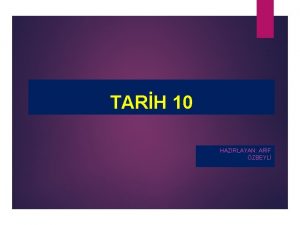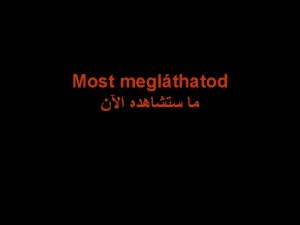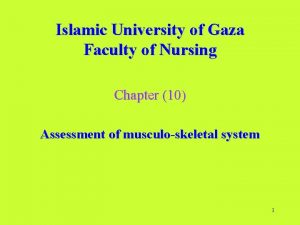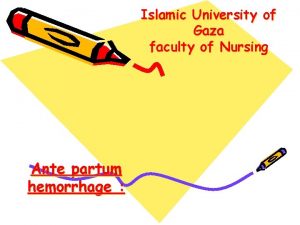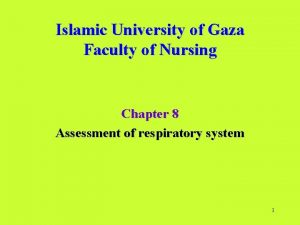Islamic University of Gaza Faculty of Nursing Pediatric








- Slides: 8

Islamic University of Gaza Faculty of Nursing Pediatric Nursing Dr. Areefa Albahri

Nutritional Disorder Malnutrition: refers to protein and energy malnutrition. n 1. Kwashiorkor: n A deficiency of protein with low or inadequate supply of calories. Occurs between 1 - 4 years of age when infant weaned from the breast, once the second child is born. n

n n n Causes: �Neglect, poverty, severe diarrhea and burns �Clinical Manifestations: �Dry and scaly skin and has depigmentation area. �Permanent blindness due to vitamin A deficiencies. �Thin and dry hair, coarse and dull, depigmentation and patchy alopecia �Loss of weight, failure of growth, the weight and height of the child are too low for the age. � Edema (ascites) from hypoalbuminemia and sever muscular atrophy. � Behavioral changes such as irritable, lethargic, withdrawn, and apathetic. �Diarrhea due to lowered resistance to infection. �Mineral deficiencies, iron, calcium and zinc


n n n Marasmus: �Is a condition primarily caused by a deficiency in calories and energy. Marasmus is a form of severe protein-energy malnutrition characterized by energy deficit. A child with marasmus looks emaciated. Body weight may be reduced to less than 80% of the average weight that corresponds to the height. �Marasmus occurrence increases prior to age 1, whereas kwashiorkor occurrence increases after 18 months. The prognosis is better than it is for kwashiorkor.

n n n �Clinical manifestation: �Gradual wasting and atrophy of body tissues, (subcutaneous fat). �Child appears old, child always hungry. The child appears underweight and very thin. �Flabby skin and wrinkled. �Apathetic, withdrawn and lethargic. �Sever and chronic malnutrition lead to decrease brain growth. �Treatment: �Providing a diet high quality in protein and carbohydrate as well vitamins and minerals. �Correction of electrolyte imbalance. �Parenteral fluid replacement to correct dehydration and restore renal function. �Fluid replacement since oral fluid is not tolerated in the initial stage of management. �Treat problems such as infection, diarrhea, parasitic infestation, and anemia.

n n n Nursing consideration: �Rest �protection from infection. �proper method of feeding. �hygiene to prevent decubitus ulcers. �daily weight.

Thank You All Any Question ? ? ?

